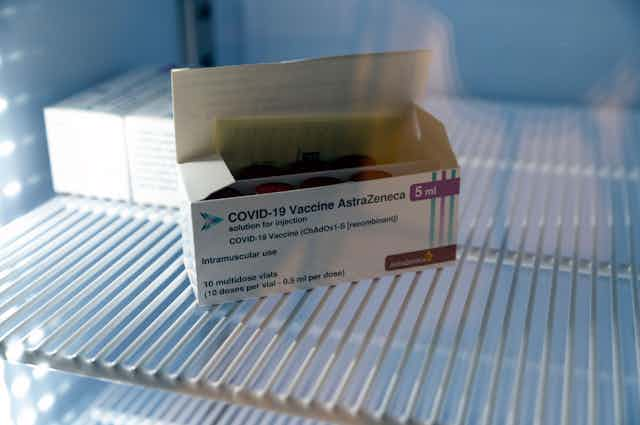The UK and EU were recently engaged in a heated disagreement over the safety of the AstraZeneca vaccine. Germany, France and other EU states halted the AstraZeneca vaccine rollout while the European Medicines Agency (EMA) investigated the possibility that the vaccine might cause a rare, sometimes fatal, blood clot called cerebral venous sinus thrombosis (CVST).
Listen to an audio version of this story here.
In the latest announcement, the EMA says that no causal link between the AstraZeneca vaccine and CVST has been proved. Their report admits that there is still a possible link to the rare blood clots, which deserves further analysis, but in the absence of proven causality rollout should continue. And, indeed, Germany, France, Italy, Spain and other European countries have said that they will resume the AstraZeneca vaccine rollout.
Some commentators framed the disagreement between the UK and EU as reflecting bad blood and division over Brexit. Others stressed disputes over how to interpret statistical patterns. Underlying these disagreements, though, was a remarkable agreement. Both UK and EU commentators seemed to agree that if the vaccine causes clots, we should stop using it. They disagreed over whether we have evidence the vaccine causes clots, not over how we should respond if it does.
The claim that if the vaccine causes deadly blood clots, then we must stop using it may be compelling to many, but it is also tricky because stopping the vaccine rollout has costs. We have excellent evidence that the AstraZeneca vaccine is effective at stopping symptoms and probably transmission. So stopping using the vaccine is equivalent to letting many people unnecessarily contract COVID-19, with potentially fatal consequences for them or others.
First, do no harm
Even if the vaccine has fatal side-effects in a few cases, vaccinating the population might save many more lives than it costs. So why the apparent agreement that if the vaccine has fatal side-effects, we should halt the rollout?
A core principle of medical ethics is “first, do no harm”. This can seem a peculiar principle – of course we don’t want doctors going around harming patients. It gets some bite if we spell it out more fully: “Do no harm, even if doing harm would lead to more benefit.”
Consider this deliberately grotesque example lecturers often use to make this point more vivid to bored students: a doctor could remove a heart and lungs from a healthy patient and use the heart to save one patient, the lungs to save another. The net result of this operation would be “positive”: two lives saved for one life lost. Still, it seems obvious that the doctor shouldn’t go around cutting open healthy patients, regardless of this “net benefit”. “First, do no harm” captures that thought.

Underlying this “do no harm” principle is a deeper claim that it is worse to do harm than to allow harm to happen. In the grotesque example, it is worse to kill someone than it is to let two people avoidably die from lack of an organ transplant. Or, in the real world case of the COVID jab, it is worse to cause some to suffer a blood clot than to let very many people die from lack of a vaccine.
Again, this distinction between what we “do” and what we “allow” can seem intuitive in some cases, such as killing one person to give her organs to others. But it is contested – and for lots of good reasons.
First, some have argued that drawing a strong distinction between doing and allowing doesn’t reflect some fundamental ethical difference, but is more like a psychological quirk of humans, grounded in a desire to avoid blame. Maybe we should just bite the bullet and accept that sometimes we have to get our hands dirty.
Second, the dividing line between doing and allowing is itself blurry. Think about another COVID case, lockdown policies. A feature of lockdown was that vulnerable women were trapped with violent partners, sometimes with tragic consequences. These consequences were predictable. In implementing lockdown, did the government “cause” these harms, or merely “allow” them to happen?
Of course, there is debate over all of these issues. Some think we can distinguish “doing” and “allowing” and that this distinction is ethically important. What is clear, though, is that debates about vaccine safety go beyond scientific debates about when we can infer claims about cause and effect. Rather, these debates are grounded in ethical assumptions that we can, and should, question and contest.

